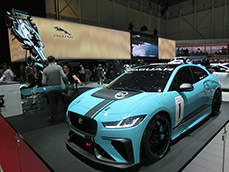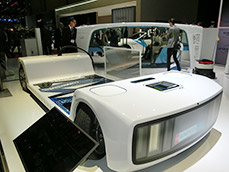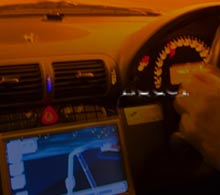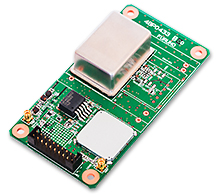Articles for ITS market Geneva show in Switzerland. Flying cars and MaaS (Mobility as a Service) were hot topics.
Many high-end EVs were announced during press day.
 Exhibits of EV and plug-in hybrid vehicles were prominent. The Volvo is pictured below.
Exhibits of EV and plug-in hybrid vehicles were prominent. The Volvo is pictured below.
 A racing car using Jaguar EV I-pace from their mass produced 2018 models.
A racing car using Jaguar EV I-pace from their mass produced 2018 models.
The annual Geneva show was held this year and press releases were also announced on March 6 before being publicly released.
Show highlight exhibits included high-class electric vehicles (EV) from Porsche, Jaguar and others. In the European market, the European Commission (EC) stipulates the world's most stringent CO2 regulation for automobiles. Specifically since it requires 95 g / km by 2021, automobile manufacturers have been promoting powertrains including hybrid cars and plug-in hybrid cars. In addition the EC set a target value for new CO2 regulation in the latter half of 2017 and aims to reduce them by 30% from 2021 to 2030. In order to clear the stringent CO2 regulations it is essential for automobile manufacturers to introduce EV’s into the market earlier than originally planned.
Amid such market changes in Europe why are only high-class EVs being introduced one by one rather than smaller, less expensive EVs?
It relates to European automobile manufacturing companies sense of competition to Tesla. Tesla has increased the 4-door coupe model S and SUV's model X unit sales and also started manufacturing the middle-class model 3 in the latter half of last year. The fact is that Tesla is trying to monopolize the high-end EV market.
In response to Tesla’s aggression in this market segment luxury car manufacturers including Daimler have an increased sense of crisis.
In response to the strengthening European CO2 regulation they are planning to strengthen sales of high-end EVs now, which is necessary to meet the New Energy Act (NEV law) to be implemented in China in 2019.
As a reference, EV sales volume in 2017 was about 777,000 units worldwide. About half of these (420,000) were sold in China. When comparing unit sales by model Chinese manufacturers are prominent however China-made EV’s are only sold in China and worldwide recognition is low.
Mass production of the Flying car may start within five or six years.
In addition to EV the media attention at the Geneva show was focused on the flying car.
Ital Design, generally known as Carozzeria, a well-established Italian design development company announced a concept model in cooperation with Airbus. The feature is that people occupy a different space when flying and are separated from land travel. In flight operations and vertical takeoff and landing is done using four large electric fans. After landing it separates from the fan assembly, integrating into normal road travel as electric vehicle platform.
A person in charge of Ital Design responded to the report saying "I want to start mass-produce in 5 or 6 years," showing an aggressive stance towards this new business.
In other flying cars news there are moves aimed at mass production in 2025 - 2030 time frame by Uber technologies, the U.S. ride sharing service and also major companies and semiconductor giants such as Intel.
In the future and in addition to revising air and road traffic laws in each country, concrete discussions on securing flight safety will increase in all over the world.
Volkswagen (VW) announced investment of 40 billion US dollars in MaaS
Alternatively German Volkswagen Group (VW) attracted some media attention from EV and flying cars.
One day before press day VW held their own event in Geneva where they announced an investment of 40 billion US dollars total for the MaaS project by 2022.
MaaS is an abbreviation for mobility as a service. In general it often refers to a new automotive business related to consumer economies such as ride and other sharing technologies.
In my personal opinion I think that MaaS is a new automobile service that combines three technical fields. They are electrification (EV), automatic operation (AV) and connected (CV).
The core business of MaaS that VW promotes is the ride sharing service "MOIA”. It will use vehicles modified for automatic, on-demand type operations and be based on medium-sized minivans manufactured and sold by VW. In Japan Nissan and DeNA conducted verification tests in Yokohama using a concept close to Easy Ride, a transportation service that utilizes automatic driving technology. In the case of Nissan / DeNA, they decided to proceed with commercialization in the early 2020s. In the VW announcement they declare the investment amount and investment period, clearly stating VW intends to become the world leader in MaaS.
In addition Daimler also showed interest using the marketing term CASE (Connected, Autonomous, Shared, Electric). The articles on MaaS are gradually increasing even in the Japanese economic media.
Also Toyota has announced the e-Palette Concept for MaaS during the USA CES show in January 2018. There is an impression that the fight for leadership in the MaaS market is intensifying everywhere in the world.
Writer introduction

Mr. Kenji Momota Automotive journalist
His major is the world automotive industry and he is also familiar with the energy industry, IT and the aging society problem as the related fields. He acts around the world based in Japan and USA and writes for the general magazines, the technology journals and the automotive related media etc.
He is also commentator of motor race and world's motor show on TV program based on his career of the driver of Indy Racing League and NASCAR. In recent years, he has been covering about a paradigm shift from developed countries to developing countries, the motorized vehicle like EV and the telematics.
FURUNO ITS Journal
Click here for the latest articles after 2022 (in Japanese)2022
- The "realistic" self-driving roadmap shown by the Japanese government and a hands-on report on the latest Subaru EyeSight X
- Will FCVs (Fuel Cell Vehicles) Become Popular? ~New Movement in Toyota and Honda~
- The 'Complete' online sales of new cars start in Japan. Will this new way of buying cars take root?
- Many Firsts! On-Site Report from Tokyo Auto Salon 2022 - The author, who knows what goes on behind the scenes, looks back on 40 years of history. -
2021
- "Moving toward zero traffic fatalities for four-wheeled and two-wheeled vehicles globally in 2050" ~Experience on Honda's latest safety technologies~
- Tsuneishi Shipbuilding's building and DX, an exclusive visit to the main factory
- Japan's Smart City: New Moves toward Practical Use
- When will self-driving buses (service cars) be put to "full-scale" practical use?
- Utilization vehicle data during disasters
- Toyota-led Connected Technology to Transform Commercial Vehicle Business -From light trucks to large trucks and buses-
- Toyota enters the connected car "Personalization" business
- Japanese automakers' carbon-neutral strategies swept up in ESG investment
- Drive experience of the latest autonomous vehicle models and advanced driving support systems
- Will carbon neutrality accelerate the trend to strengthen LCA (Life Cycle Assessment)?
- Semiconductor shortage exposes realities of the automotive industry
- Online Autonomous Driving Contest Enhancing development of Human Resources
2020
- What happens to CASE when gas cars are banned in Japan?
- When will Flying Cars be launched?
- Expectation vs. reality:Autonomous Driving in Japan
- V2X, Becoming increasingly important in autonomous driving
- Technology of Subaru “EyeSight X”
- Lifestyle-oriented French cars gain popularity in Japan
- Human-oriented smart cities are wanted
- MaaS and CASE, how would automotive industry change after COVID-19?
- The beginning of virtualization era, triggered by COVID-19
- Trend of EV shift and consumer demands
- TOYOTA Press conference about ADAS - Releasing algorithm for "sudden acceleration suppression during attempted sudden acceleration" free of charge -
- The Japanese automotive industry in 2020 - 3 turning points -
- "Using a smartphone while driving" and "Level 3 automated driving"
2019
- Motor show business model is at a turning point - Tokyo Motor Show Report -
- Commercialization and monetization of MaaS - ITS World Congress Singapore Report -
- Android Automotive pays attention to V2X - Report from the Frankfurt Motor Show 2019 in Germany -
- Automobile Distribution Revolution and DCM (Data Communication Module)
- Connected business potential and newly proposed "eMaaS" by Honda
- 5G services for practical use are multiplying
- Connectivity technologies attracting attention due to frequent traffic accidents
- Shanghai Motor Show report -SUV, EV, Automated car & 5G-
- Drone Business roadmap and updates to Michibiki (Quasi-Zenith Satellite System)
- MaaS (Mobility as a Service) "town development." Full-scale promotion for a national project
- CES organizer states "Data Period in 2020s." Transformation of the Automotive Industry in CES, US "-CES2019 Report-"
- "Return to Origin" directed towards the age of change, automatic operation and connectivity
2018
- New proposal for Private Car Automated Driving Level and other Hot 5G Technology Topics
- Standardized EV charging infrastructure concerns in Europe, US, Japan and China - Kobe EVS 31 field report -
- Touring a pure car carrier and a test drive of the latest hybrid car
- Planning stage products are exhibited at the newly established visualized mobility service "TOYOTA MOBILITY SHOWROOM".
- Potential “Community Car-share” program promoted by local residents
- CES Asia Report 2108
- Companies attempt new Vehicle-to-Infrastructure communications, including traffic volume measurements and vehicle positioning. -ITS Asia Pacific Forum in Fukuoka-
- Geneva show in Switzerland. Flying cars and MaaS (Mobility as a Service) were hot topics.
- EV (Electric Vehicle) proposals by country
- MaaS competition through service mobilization, M & A and technical field collaboration is accelerating. - The CES 2018 Report -
2017
- Big data’s initiative and fight for the automotive industry. Cooperation among companies becomes increasingly important.
- Connected car and road-to-vehicle communication automatic operation
- ETC (Electronic Toll Collection) and ETC2.0. Current situation and projected future
- Rapid development of sharing economy
- Germany is first to recognize level 3 automated driving
- ITS EU 2017 Field Reports -Automatic Operation and the eCall-
- From Infotainment to ITS, the competitive area is spreading in the car big data industry.
- GTC (GPU Technology Conference) Report and the de facto standardization of AI (artificial intelligence)
- Renesas' new challenge! "e-AI Solution" and "Renesas Autonomy"
- The Automobile industry is shifting from a manufacturing industry to a service industry.
- The movement toward accident countermeasures for aging drivers in Japan
- Fusion of ride sharing and fully automated driving is advancing in the USA.
2016
- Overview of the Quasi-Zenith Satellite System (QZSS) and advancements toward full-scale practical use including the Tokyo Olympic Games - G-space EXPO 2016 report-
- Japan’s automated driving project "SIP-adus" will be a large demonstration experiment.
- The International Home Care & Rehabilitation Exhibition. There were many car manufactures with exhibits booths at this show.
- Japanese car manufacturers starting to concentrate on strengthening the ADAS system
- A new movement of legislation for autonomous cars
- Cyber Security and “AGL”, the new OS for automotive are hot topics in the connected car industry
- “High precision 3D map” the key future of autonomous car and pedestrian dead reckoning
- Chinese “BAT” is accelerating their business in the EV (Electric Vehicle) market
- Tesla's original connection to Taiwan and the new transportation system technologies.
- "The main topic" of the Geneva Motor Show was how to strengthen "pedestrian protection"
- The probe data business is getting more competitive
- Reporting directly from the 2016 CES show "Data services will soon become the main revenue source of automotive industry"
2015
- Do the automated driving systems need the GNSS (Global Navigation Satellite System) ?
- ETC Version 2.0 is coming soon. A new service was announced at the Tokyo Motor Show and the possibility that is could be used as a device for older drivers.
- "Connected Horizon" and "eHorizon". Germany's leading parts supplier accelerates strengthening of "Big Data" for business



 A flying car that was jointly designed by Italy's Ital Design and Airbus.
A flying car that was jointly designed by Italy's Ital Design and Airbus. Concept MaaS model exhibited from RinSpeed a Switzerland company.
Concept MaaS model exhibited from RinSpeed a Switzerland company. GPS/GNSS Receiver&Chips and Modules (positioning and timing)
GPS/GNSS Receiver&Chips and Modules (positioning and timing)